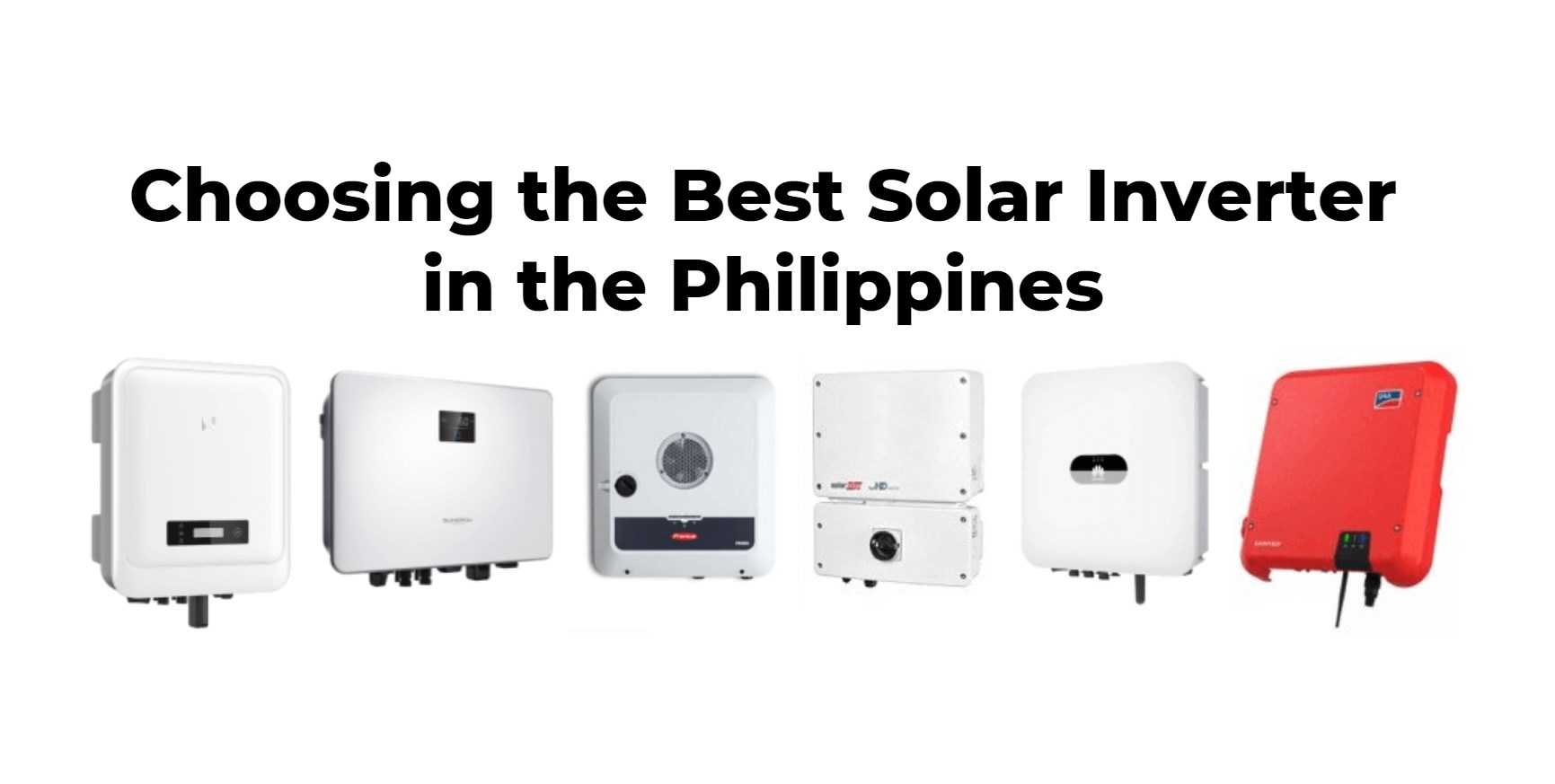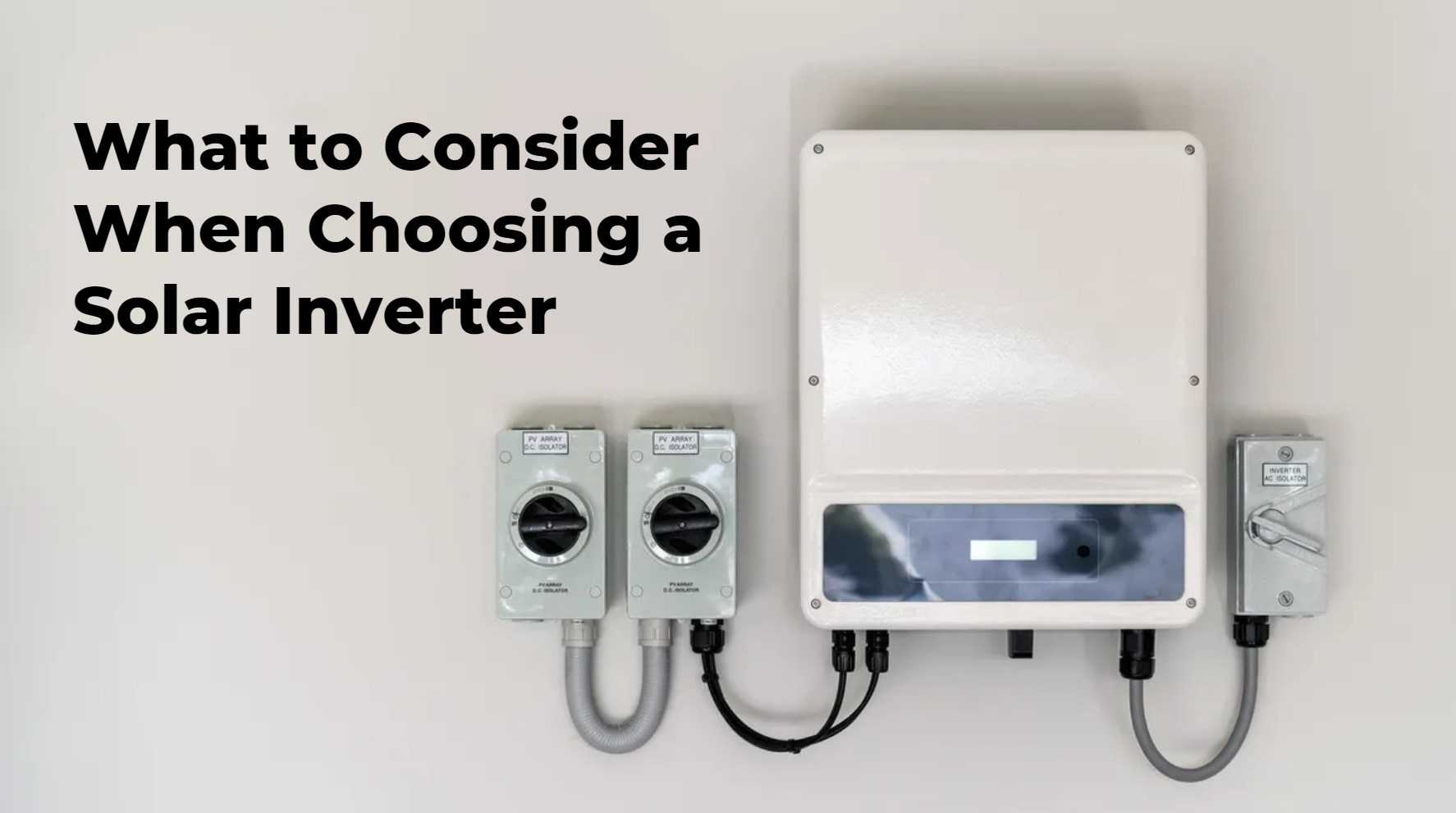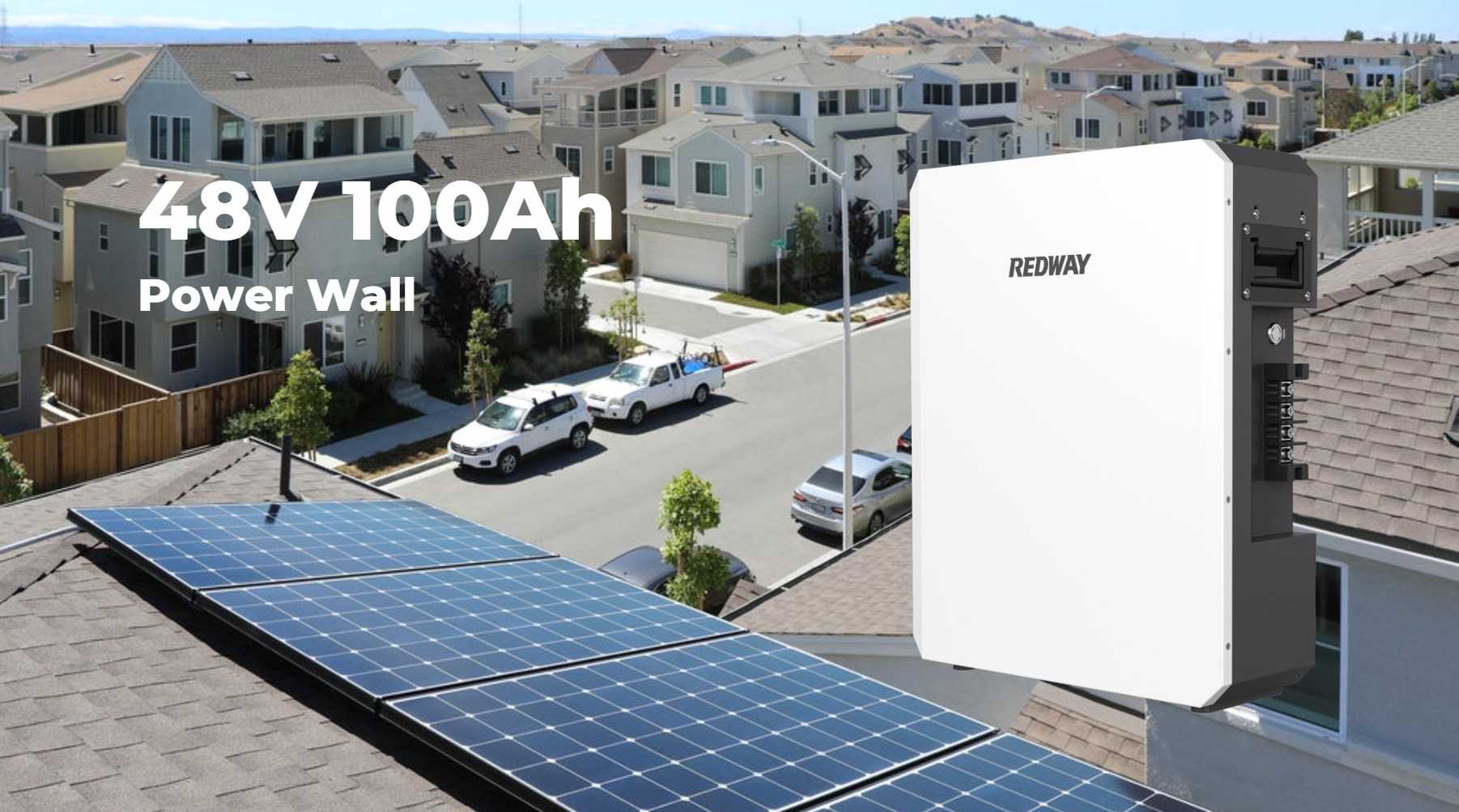Harnessing solar energy is becoming increasingly popular as a sustainable and cost-effective solution for powering our homes and businesses. And at the heart of any solar power system lies the solar inverter – a crucial component that converts the DC electricity generated by your solar panels into usable AC electricity for your appliances.
Introduction to Solar Inverters
- Solar Inverters: Solar inverters are critical components of a solar energy system that convert DC power from solar panels into AC power for use in homes and feeding into the grid.
- System Efficiency and Reliability: Solar inverters play a crucial role in optimizing the efficiency and reliability of a solar energy system by ensuring the proper conversion of power and facilitating seamless integration with the electrical grid.
- Types of Solar Inverters: There are different types of solar inverters, including string inverters and microinverters. String inverters are suitable for systems with uniform panel orientation, while microinverters offer advantages in scenarios with shading or panel-specific issues.
- Considerations for Selection: When choosing a solar inverter, factors such as panel location, shading patterns, and system size should be considered. It is essential to consult with reputable solar installation professionals to make informed decisions.
Types of Solar Inverters
-
On-grid Solar Inverters: On-grid solar inverters, also known as grid-tied inverters, are connected to the electrical grid. They offer high conversion efficiency and can quickly disconnect from the grid during power outages. These inverters allow for the direct use of solar power and the option to sell excess power back to the grid.
-
Micro Solar Inverters: Micro inverters are connected directly to each solar panel in the system. They offer plug-and-play installation, high efficiency, and individual panel monitoring. This type of inverter is beneficial for systems with shading or panel-specific issues.
-
Hybrid Solar Inverters: Hybrid inverters are suitable for solar power systems that include battery packs. They store excess energy in batteries for use during periods of low solar generation or power outages. Hybrid inverters provide a seamless transition between grid power, solar power, and battery power.
What to Consider When Choosing a Solar Inverter
- Type of Inverter: Understand the different types of solar inverters available, including string inverters, microinverters, and power optimizers. Each type has its own advantages and considerations.
- Power Rating: Determine the capacity of the inverter based on the size of your solar panel system to ensure it can handle the maximum power output.
- Efficiency: Look for an inverter with high efficiency ratings to minimize energy loss during power conversion.
- Durability and Reliability: Choose a durable and weather-resistant inverter that can withstand outdoor conditions.
- Monitoring and Data Logging: Consider if the inverter offers monitoring features to track the performance of your solar panel system and identify any issues.
- Warranty and After-Sales Support: Check the warranty period and the reputation of the manufacturer for reliable after-sales support.
- Compatibility: Ensure the inverter is compatible with your specific panel technologies and grid requirements.
- Additional Features: Assess if the inverter offers advanced features that align with your current or future needs.
- Cost: Consider the price of the inverter in relation to its features, performance, and reliability.
Top Solar Inverter Brands in the Philippines
When it comes to choosing a solar inverter for your system, you want to make sure you’re investing in a reliable and trusted brand. In the Philippines, there are several top-notch brands that have established themselves as leaders in the industry.
Wholesale lithium golf cart batteries with 10-year life? Check here.
One such brand is SolarEdge. Known for their cutting-edge technology and advanced features, SolarEdge inverters offer high efficiency and exceptional performance. They also come with built-in monitoring capabilities, allowing you to keep track of your system’s performance at all times.
Another popular option is SMA Solar Technology. With over 35 years of experience, SMA has earned a reputation for producing high-quality inverters that deliver excellent reliability and durability. Their products are known for their user-friendly interfaces and seamless integration with other components of your solar system.
Want OEM lithium forklift batteries at wholesale prices? Check here.
For those looking for an affordable yet reliable option, Growatt is worth considering. This Chinese brand has gained popularity in the Philippines due to its cost-effective solutions without compromising on quality or performance.
Fronius is another reputable brand that offers a wide range of inverters suitable for different types of installations. With innovative design features and robust construction, Fronius inverters ensure maximum energy yield while maintaining long-term durability.
When it comes to choosing the best solar inverter brand in the Philippines, consider factors like technological advancements, reliability, affordability,and compatibility with your specific needs. By doing thorough research and reading customer reviews,recommendations,you can find the perfect fit for your solar system!
Features and Benefits of Each Brand
When it comes to choosing the best solar inverter for your needs, considering the features and benefits of each brand is crucial. Let’s take a closer look at some of the top solar inverter brands available in the Philippines and what sets them apart.
Brand A offers advanced MPPT (Maximum Power Point Tracking) technology, which ensures maximum efficiency by constantly tracking and optimizing power output. This feature allows you to generate more electricity from your solar panels, maximizing your savings on energy bills.
Brand B specializes in hybrid inverters that not only convert DC power from sunlight into AC power but also have built-in battery storage capabilities. This means you can store excess energy during the day and use it at night or during power outages, providing greater flexibility and reliability.
Brand C stands out with its user-friendly interface and monitoring capabilities. Their inverters come with intuitive mobile apps that allow you to monitor real-time system performance, track energy production, and even receive notifications if any issues arise. This level of control empowers users to optimize their system’s performance easily.
Brand D offers robust durability and reliability. Their inverters are designed to withstand harsh weather conditions such as high temperatures and humidity levels commonly experienced in tropical countries like the Philippines. With a long lifespan, these inverters provide peace of mind knowing they can handle whatever Mother Nature throws their way.
Each brand has its own unique features that cater to different needs and preferences. Determining which one is best for you will depend on factors such as budget, desired functionality, and installation requirements.
Customer Reviews and Recommendations
When it comes to choosing the best solar inverter for your system, it’s always helpful to hear from those who have already made a purchase. Customer reviews and recommendations can provide valuable insights into the performance and reliability of different brands.
Many customers praise Solar Brand X for its durability and efficiency. They highlight its ability to convert solar energy into usable electricity with minimal loss. One customer mentioned that they have been using Solar Brand X for several years without any major issues, which speaks volumes about its reliability.
Another popular choice among customers is Solar Brand Y. Users rave about its user-friendly interface and easy installation process. One reviewer even mentioned that they were able to set up their entire system within a day, thanks to the detailed instructions provided by the brand.
Solar Brand Z also receives high marks from customers for its excellent customer service. Many reviewers mention how responsive and knowledgeable the company’s support team is, providing assistance whenever needed.
Customer reviews play an important role in helping prospective buyers make informed decisions when selecting a solar inverter brand. It’s essential to carefully consider these recommendations along with other factors such as price point and warranty coverage before making your final choice.
Conclusion: Making the Right Choice for Your Solar System
With the increasing popularity of solar energy in the Philippines, choosing the best solar inverter is crucial to ensure optimal performance and efficiency for your solar system. By taking into consideration factors such as type, brand reputation, features, and customer reviews, you can make an informed decision that suits your specific needs.
When it comes to types of solar inverters, there are several options available including string inverters, microinverters, and hybrid inverters. Each has its own advantages and considerations based on factors like system size, shading issues, and budget constraints.
In terms of top solar inverter brands in the Philippines, reputable names such as Huawei FusionSolar Inverters, SMA Solar Technology AG Inverters (Sunny Boy/Sunny Tripower), Growatt New Energy Technology Co., Ltd Inverters have made a mark with their advanced technology solutions.
While each brand offers unique features and benefits tailored to different requirements of consumers like reliability,durability,and ease-of-use,it’s important to consider factors such as warranty coverage,customer support,and compatibility with other components when making a choice.
FAQs
Which brand is best for solar inverters?
Looking for the best brand for solar inverters? Look no further! SolarEdge, Enphase, SMA, and Tigo are some of the top brands in the market. When choosing the best brand, consider factors like performance, warranties, cost, and personal preference. SolarEdge offers optimized string inverters, Enphase specializes in microinverters, SMA provides reliable string inverters, and Tigo offers optimized string inverters with high voltage performance. Compare these brands to find the perfect solar inverter for your needs.
How to choose the best solar inverter?
Look no further! Whether you’re considering string inverters, microinverters, or power optimizers, there are key factors to consider. These include system compatibility, efficiency rates, size and scalability, installation location, warranty and support, advanced features, and cost. String inverters are cost-effective and work well in direct sun, while microinverters offer panel-level optimization and shade management. Power optimizers combine the benefits of string inverters and microinverters. Work with a reputable solar installer to find the perfect inverter that aligns with your energy goals and budget.
What to look for when buying an inverter?
Here’s what you need to consider. First, determine the power capacity required for your devices. Choose between pure sine wave and modified sine wave inverters based on your electronics’ sensitivity. Look for high efficiency to minimize energy losses. Match the battery voltage with the inverter. Ensure the inverter can handle startup loads with surge capacity. Consider battery charging capability and an automatic transfer switch for seamless power supply. Look for safety features, low noise level, and informative display. Choose a reputable brand with good customer support and warranty. Consider these factors to find the perfect inverter for your needs.
What type of inverter is most efficient?
Consider different types such as string inverters, microinverters, power optimizers, and central inverters. String inverters are cost-effective, while microinverters offer higher efficiency and better energy production in shading scenarios. Power optimizers provide a balance between efficiency and cost, and central inverters are efficient for large-scale installations with uniform sunlight exposure. Choose the type of inverter that best suits your specific needs and requirements to maximize efficiency and optimize energy conversion for your solar system.








